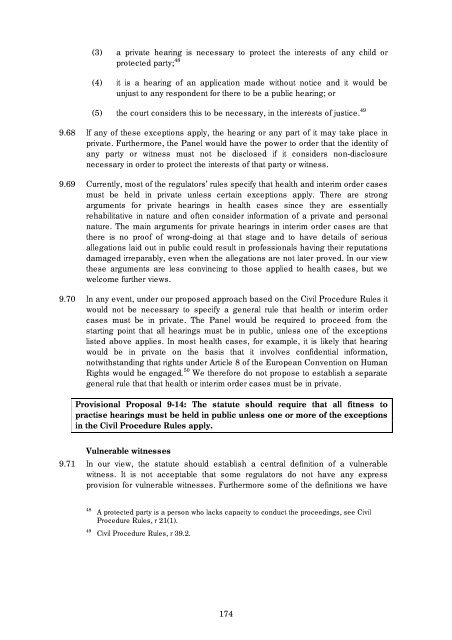Regulation of Health and Social Care Professionals Consultation
Regulation of Health and Social Care Professionals Consultation
Regulation of Health and Social Care Professionals Consultation
You also want an ePaper? Increase the reach of your titles
YUMPU automatically turns print PDFs into web optimized ePapers that Google loves.
(3) a private hearing is necessary to protect the interests <strong>of</strong> any child or<br />
protected party; 48<br />
(4) it is a hearing <strong>of</strong> an application made without notice <strong>and</strong> it would be<br />
unjust to any respondent for there to be a public hearing; or<br />
(5) the court considers this to be necessary, in the interests <strong>of</strong> justice. 49<br />
9.68 If any <strong>of</strong> these exceptions apply, the hearing or any part <strong>of</strong> it may take place in<br />
private. Furthermore, the Panel would have the power to order that the identity <strong>of</strong><br />
any party or witness must not be disclosed if it considers non-disclosure<br />
necessary in order to protect the interests <strong>of</strong> that party or witness.<br />
9.69 Currently, most <strong>of</strong> the regulators’ rules specify that health <strong>and</strong> interim order cases<br />
must be held in private unless certain exceptions apply. There are strong<br />
arguments for private hearings in health cases since they are essentially<br />
rehabilitative in nature <strong>and</strong> <strong>of</strong>ten consider information <strong>of</strong> a private <strong>and</strong> personal<br />
nature. The main arguments for private hearings in interim order cases are that<br />
there is no pro<strong>of</strong> <strong>of</strong> wrong-doing at that stage <strong>and</strong> to have details <strong>of</strong> serious<br />
allegations laid out in public could result in pr<strong>of</strong>essionals having their reputations<br />
damaged irreparably, even when the allegations are not later proved. In our view<br />
these arguments are less convincing to those applied to health cases, but we<br />
welcome further views.<br />
9.70 In any event, under our proposed approach based on the Civil Procedure Rules it<br />
would not be necessary to specify a general rule that health or interim order<br />
cases must be in private. The Panel would be required to proceed from the<br />
starting point that all hearings must be in public, unless one <strong>of</strong> the exceptions<br />
listed above applies. In most health cases, for example, it is likely that hearing<br />
would be in private on the basis that it involves confidential information,<br />
notwithst<strong>and</strong>ing that rights under Article 8 <strong>of</strong> the European Convention on Human<br />
Rights would be engaged. 50 We therefore do not propose to establish a separate<br />
general rule that that health or interim order cases must be in private.<br />
Provisional Proposal 9-14: The statute should require that all fitness to<br />
practise hearings must be held in public unless one or more <strong>of</strong> the exceptions<br />
in the Civil Procedure Rules apply.<br />
Vulnerable witnesses<br />
9.71 In our view, the statute should establish a central definition <strong>of</strong> a vulnerable<br />
witness. It is not acceptable that some regulators do not have any express<br />
provision for vulnerable witnesses. Furthermore some <strong>of</strong> the definitions we have<br />
48<br />
A protected party is a person who lacks capacity to conduct the proceedings, see Civil<br />
Procedure Rules, r 21(1).<br />
49 Civil Procedure Rules, r 39.2.<br />
174
















